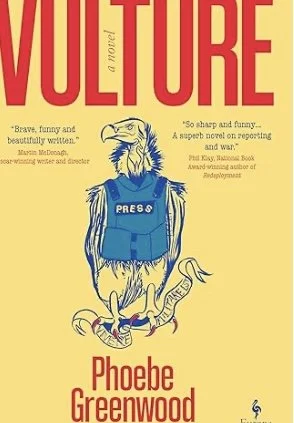Vulture by Phoebe Greenwood (Europa Editions)~Janet Brown
Sara Byrne plunges into Gaza with wit and dash. She’s still smarting from a disastrous love affair, mourning her father’s death, armed with a degree in International Relations and a brief stint of writing for the women’s pages of a Sunday supplement. After an expensive and fortuitous encounter with a renowned journalist in a Jerusalem hotel bar, she’s been hired to file stories that he can’t be bothered to write.
Gaza is old news in 2012 . “Compared to Iraq or Afghanistan, it’s child’s play,” one reporter tells Sara, “this war was won in ‘67.”
Sara doesn’t care. She’s out to make a name for herself, one that the man who spurned her will see on the front pages of the morning paper. Ensconced in Gaza’s best hotel with an expense account, surrounded by a phalanx of experienced journalists, and assisted by one of the top three fixers in the area, she brings her gift of observation and her knack for apt descriptions into a war-wracked city. She’s aided by her naive fearlessness that leads her to “risk the air-struck night,” with the belief that journalists “didn’t die in Gaza,” and her eerie lack of emotion as she visits morgues that hold the bodies of children and blood-drenched hospital wards where there are no empty beds and few medical supplies.
She pours herself into phrases that are as funny as they are vicious, describing her fixer, who becomes tougher and thinner by the day, as “a man raisin.” The child of a hotel worker has “the gait and expression of a middle-aged Glaswegian nightclub bouncer.” A spokesperson for Hamas has “facial hair so precise it could have been styled with a diamond cutter.”
Being shepherded along with other reporters to scenes of destruction and violence wreaked by drones that guide bombers “like psycho robot cicadas” isn’t enough for Sara. Her goal is to get into Gaza’s “terror tunnels” and interview the commander who’s feared even by Hamas, and as rumors of a peace treaty begin to surface, she becomes ruthless in achieving this. Then she tumbles into a nervous breakdown that’s akin to madness and Vulture turns away from war into a version of Bridget Jones Cracks Up, told in excruciating detail for the final half of the book.
Phoebe Greenwood was a freelance correspondent in the Middle East from 2010 to 2013 and she knows precisely what she’s doing. She makes the war in Gaza vividly real through Sara’s eyes and then allows her to lapse into maudlin self-pity and demented self-interest. As readers condemn Sara for letting her very ordinary life obscure the horrors of war, we realize this is precisely what we do every day, turning our attention from starvation and obliteration in Gaza. We all are sitting on an unmade bed, consoling ourselves with chocolate, consumed by our personal dramas.
“You watch us die, you watch us grieve…Do you help? No,” the mother of a dead child tells Sara and we recognize ourselves. While journalists are the vultures “who make a living from death and disaster,” we’re the vultures who feed ourselves on what they scavenge and toss to us in concise, colorful 500-word pieces in the daily paper. LIke Sara, we learn the facts, the reasons, the death counts and we turn away, going back to the lives we’re fortunate to live.
Vultures.
